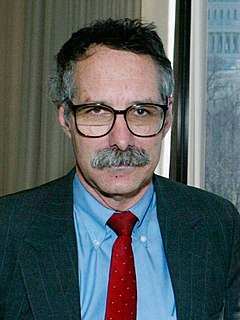A Quote by Steve Mnuchin
Let me tell you, one of the most proud aspects of my career was buying Indymac during the financial crisis.
Related Quotes
One intriguing subplot of the economic crisis is the failure of most economists to predict it. Here we have the most spectacular economic and financial crisis in decades - possibly since the Great Depression - and the one group that spends most of its waking hours analyzing the economy basically missed it.
It is at a time like this, when crisis threatens the stomach, that the French display the most sympathetic side of their nature. Tell them stories of physical injury or financial ruin and they will either laugh or commiserate politely. But tell them you are facing gastronomic hardship, and they will move heaven and earth and even restaurant tables to help you.
The Fed contributed to the financial crisis, keeping interest rates too low for too long. I give them credit for responding and stabilizing the economy and the financial sector during the crisis. But then they tried to do too much with quantitative easing that went on forever, just dramatically exploding their balance sheets.


































